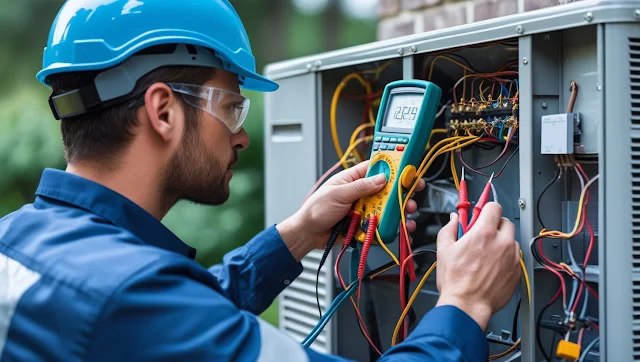Is your AC blowing warm air or making strange noises? You might be dealing with a failing AC compressor! The compressor is the heart of your air conditioning system, responsible for circulating refrigerant and keeping your home cool. When it fails, your AC system loses its efficiency, leading to discomfort and higher energy bills.
In this guide, we’ll cover
everything you need to know about AC compressor repair—common issues,
diagnosis, repair steps, costs, and maintenance tips to keep your unit running
smoothly.
How
an AC Compressor Works
Understanding how an AC compressor
functions can help you identify problems early. The compressor plays a vital
role by:
S.K ENTERPRISES – Your Reliable HVAC & AC Service Provider in Noida
- Compressing refrigerant: It pressurizes the refrigerant gas and moves it
through the system.
- Maintaining cooling efficiency: The compressed gas cools down when it reaches the
condenser coils, helping to lower indoor temperatures.
- Ensuring proper airflow: The compressor works with the evaporator and condenser coils to regulate airflow and temperature.
When this system is disrupted, your
AC struggles to cool efficiently, leading to increased energy consumption and
potential damage.
Get the best HVAC & AC services today!
Common
AC Compressor Problems
A faulty AC compressor can be caused
by several factors, including:
- Low Refrigerant Levels – Insufficient refrigerant forces the compressor to
work harder, leading to overheating and failure.
- Electrical Issues
– Faulty wiring, capacitor failures, or burnt fuses can prevent the
compressor from starting.
- Compressor Overheating – Poor ventilation, excessive usage, or clogged
filters can cause overheating and damage.
- Contaminated or Clogged Compressor – Dust, debris, and moisture can clog the compressor,
reducing efficiency.
- Mechanical Failures – Worn-out bearings, broken valves, or damaged pistons can prevent the compressor from functioning correctly.
Identifying these issues early can
prevent expensive repairs and extend the lifespan of your AC unit.
Diagnosing
AC Compressor Issues
Before jumping to repairs, it’s
essential to diagnose the problem correctly. Here’s how:
- Check for Symptoms:
- Warm air blowing from vents
- Loud noises or vibrations from the outdoor unit
- Frequent circuit breaker trips
- AC unit not turning on
- Electrical Testing:
- Inspect wiring and capacitors for visible damage
- Test for continuity using a multimeter
- Refrigerant Pressure Check:
- Use pressure gauges to measure refrigerant levels
- Low pressure often indicates a leak or undercharging
If you’re unsure about the
diagnosis, consulting an HVAC professional is the best option.

Steps
for AC Compressor Repair
1.
Basic Troubleshooting
- Check power supply, circuit breakers, and fuses.
- Ensure the thermostat is set to the correct
temperature.
- Inspect refrigerant levels for any leaks.
2.
Cleaning & Maintenance
- Remove debris and dirt from condenser coils.
- Clean or replace air filters regularly.
- Ensure proper airflow around the outdoor unit.
3.
Replacing Faulty Parts
- If the capacitor or relay is faulty, replace them
immediately.
- Damaged wiring or connections should be repaired by a
professional.
4.
Professional Repair vs. DIY Fixes
- DIY repairs:
Suitable for minor issues like cleaning filters or resetting circuit
breakers.
- Professional repairs:
Necessary for refrigerant leaks, mechanical failures, or complete
compressor replacement.
Cost
of AC Compressor Repair
The cost of AC compressor repair
depends on various factors, including the severity of the issue and the type of
AC unit. Here’s a general breakdown:
|
Repair
Type |
Estimated
Cost (USD) |
|
Minor repairs (wiring, fuses,
capacitor) |
300/- - 600/- |
|
Refrigerant recharge |
400/- - 800/- |
|
Compressor replacement |
3,000/- - 6,500 |
|
Labor charges (HVAC technician) |
250/- - 400/- per hour |
S.K ENTERPRISES – Your Reliable HVAC & AC Service Provider in Noida
Repair
vs. Replacement: Which is Better?
- Repair:
Cost-effective if the issue is minor and the unit is under 10 years old.
- Replacement:
Ideal if the compressor is severely damaged or the AC system is outdated.
Preventative
Maintenance Tips
Regular maintenance can help prevent
costly AC compressor repair and extend the lifespan of your unit. Follow
these tips:
- Schedule regular servicing at least once a year.
- Keep the unit clean
by removing dirt and debris from condenser coils.
- Use the right refrigerant as recommended by the manufacturer.
- Avoid frequent on/off cycles to reduce compressor strain.
Following these maintenance tips
ensures your AC system remains energy-efficient and reliable.
Conclusion
A failing AC compressor can lead to
inefficiency, discomfort, and high repair costs. By recognizing early signs of
trouble, performing basic troubleshooting, and seeking professional help when
needed, you can keep your AC running smoothly.
Regular maintenance and timely AC
compressor repair can save you money and prevent unexpected breakdowns. If
your AC is acting up, don’t wait—get it inspected and repaired before it turns
into a costly problem!



.jpg)





